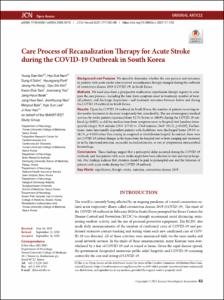Care Process of Recanalization Therapy for Acute Stroke during the COVID-19 Outbreak in South Korea
- Keimyung Author(s)
- Sohn, Sung Il; Park, Hyoung Seob
- Journal Title
- Journal of Clinical Neurology
- Issued Date
- 2021
- Volume
- 17
- Issue
- 1
- Abstract
- Background and Purpose:
We aimed to determine whether the care process and outcomes in patients with acute stroke who received recanalization therapy changed during the outbreak of coronavirus disease 2019 (COVID-19) in South Korea.
Methods:
We used data from a prospective multicenter reperfusion therapy registry to compare the care process—including the time from symptom onset to treatment, number of treated patients, and discharge disposition—and treatment outcomes between before and during the COVID-19 outbreak in South Korea.
Results:
Upon the COVID-19 outbreak in South Korea, the number of patients receiving endovascular treatment to decrease temporarily but considerably. The use of emergency medical services by stroke patients increased from 91.5% before to 100.0% during the COVID-19 outbreak (p=0.025), as did the median time from symptom onset to hospital visit [median (interquartile range), 91.0 minutes (39.8–277.0) vs. 176.0 minutes (56.0–391.5), p=0.029]. Furthermore, more functionally dependent patients with disabilities were discharged home (59.5% vs. 26.1%, p=0.020) rather than staying in a regional or rehabilitation hospital. In contrast, there were no COVID-19-related changes in the times from the hospital visit to brain imaging and treatment or in the functional outcome, successful recanalization rate, or rate of symptomatic intracerebral hemorrhage.
Conclusions:
These findings suggest that a prehospital delay occurred during the COVID-19 outbreak, and that patients with acute stroke might have been reluctant to visit and stay in hospitals. Our findings indicate that attention should be paid to prehospital care and the behavior of patients with acute stroke during the COVID-19 outbreak.
- Publisher
- School of Medicine (의과대학)
- Citation
- Young Dae Kim et al. (2021). Care Process of Recanalization Therapy for Acute Stroke during the COVID-19 Outbreak in South Korea. Journal of Clinical Neurology, 17(1), 63–69. doi: 10.3988/jcn.2021.17.1.63
- Type
- Article
- ISSN
- 2005-5013
- Source
- https://www.thejcn.com/search.php?where=aview&id=10.3988/jcn.2021.17.1.63&code=0145JCN&vmode=FULL
- Appears in Collections:
- 1. School of Medicine (의과대학) > Dept. of Internal Medicine (내과학)
1. School of Medicine (의과대학) > Dept. of Neurology (신경과학)
- 파일 목록
-
-
Download
 oak-2021-0015.pdf
기타 데이터 / 331.3 kB / Adobe PDF
oak-2021-0015.pdf
기타 데이터 / 331.3 kB / Adobe PDF
-
Items in Repository are protected by copyright, with all rights reserved, unless otherwise indicated.